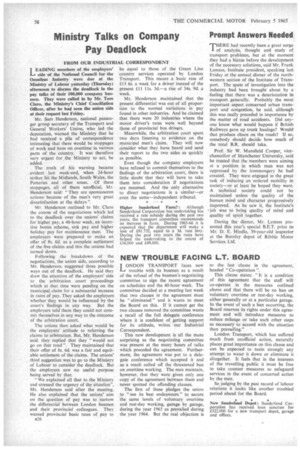NEW TROUBLE FACING LT. BOARD
Page 60

If you've noticed an error in this article please click here to report it so we can fix it.
LONDON TRANSPORT faces new .1--f trouble with its busmen as a result of the refusal of the busmen's negotiating committee to sign the recent agreement on schedules and the 40-hour week. The committee decided at a meeting last week that two clauses in the agreement must be "eliminated" and it wants to meet the Board on this. If it cannot get the two clauses removed the committee wants a recall of the full delegate conference where it is confident of getting support for its attitude, writes our Industrial Correspondent.
This new development is all the more surprising as the negotiating committee was present at the many hours of talks which preceded the agreement. Furthermore, the agreement was put to a delegate conference which accepted it and as a result called off the threatened ban on overtime working. The men maintain, however, that they were given only one copy of the agreement between them and never spotted the offending clauses.
The first of these pledges the union to "use its best endeavours" to secure the same levels of voluntary overtime and rest-day working, garage by garage, during the year 1965 as prevailed during the year 1964. But the real objection is to the last clause in the agreement, headed "Co-operation ".
This clause states: "It is a condition of this agreement that the staff will co-operate in the measures outlined above and that there will be no ban on voluntary overtime or rest-day working, either generally or at a particular garage. In the event of such a ban occurring, the Board reserves its rights under this agreement and will introduce measures to reduce mileage or take such other steps as necessary to accord with the situation then prevailing."
London Transport, which has suffered much from unofficial action, naturally places great importance on this clause and can be expected to resist strongly any attempt to water it down or eliminate it altogether. It feels that in the interests of the travelling public it must be free to take counter measures to safeguard services in the event of concerted action by the men.
So judging by the past record of labour relations it looks like_ another troubled period ahead for the Board.


















































































































































































